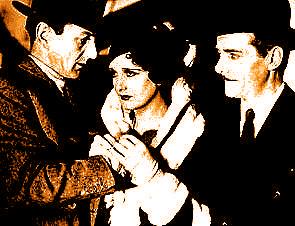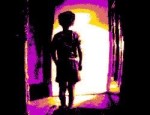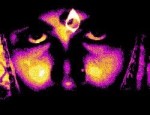Film Review

Number Seventeen is certainly an atypical Hitchcock film - an unbridled parody of the low budget crime thrillers that were prevalent in the early 1930s. It probably helped that this film had a shoestring budget - evidenced by the poor quality of the models in the chaotic denouement. The film has often been criticised for its production weaknesses and virtually incomprehensible plot, but such criticisms generally miss the point of the film. Number Seventeen is a warning of what cinema was in danger of becoming - a mindless spectacle of muddled intrigue and artistic self-indulgence, without any real substance or meaning. If Hitchcock were around today he would probably grin nonchalantly and mutter: "Told you so".
© James Travers 2008
The above content is owned by frenchfilms.org and must not be copied.
Film Synopsis
On entering a seemingly abandoned old house one night, a detective discovers a Cockney tramp named Ben and a dead body. An attractive young girl named Rose suddenly falls in through a skylight. She hands over a telegram which announces a group of thieves are shortly to arrive at the house to collect a stolen necklace. Right on cue, a strange couple appear on the doorstep, masquerading as a pair of nocturnal house hunters...© James Travers
The above content is owned by frenchfilms.org and must not be copied.
Similar Films
Here are some other films you may enjoy watching:- The Ladykillers (1955)
- His Kind of Woman (1951)
- Bande à part (1964)
- Les Tontons flingueurs (1963)
- Tête blonde (1949)
Other related links:
Film Credits
- Director: Alfred Hitchcock
- Script: Joseph Jefferson Farjeon, Alma Reville, Alfred Hitchcock, Rodney Ackland
- Cinematographer: Jack E. Cox, Bryan Langley
- Music: Adolph Hallis
- Cast: Leon M. Lion (Ben), Anne Grey (Nora - the Girl), John Stuart (Barton - the Detective), Donald Calthrop (Brant - Nora's Escort), Barry Jones (Henry Doyle), Ann Casson (Rose Ackroyd), Henry Caine (Mr. Ackroyd), Garry Marsh (Sheldrake), Herbert Langley (The Guard on Train)
- Country: UK
- Language: English
- Support: Black and White
- Runtime: 63 min
- Aka: Number 17
The very best sci-fi movies

The best of Indian cinema

The very best American film comedies
